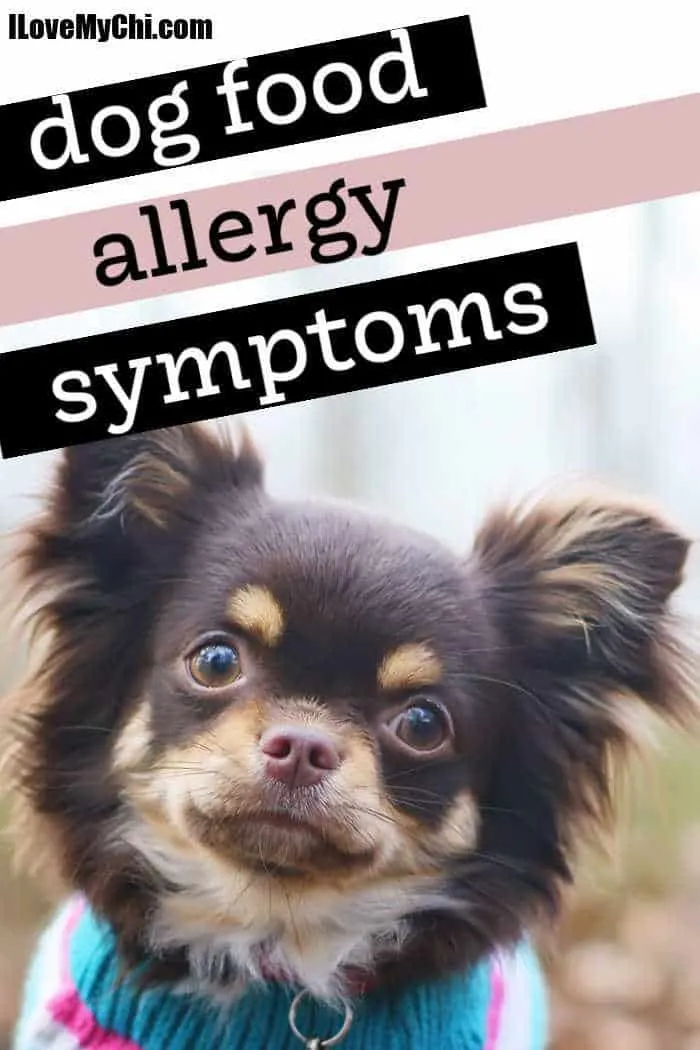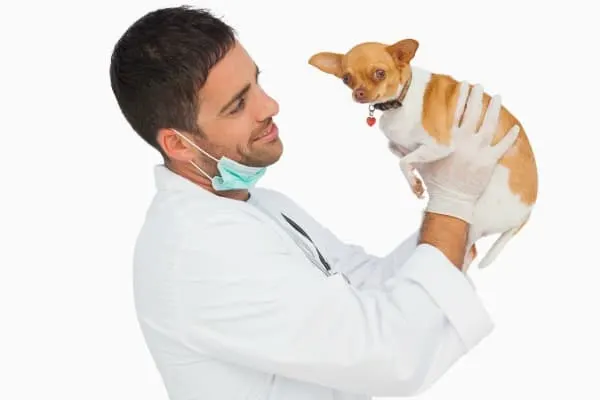
What Causes Allergies In Dogs?
According to VCA Animal Hospitals, an allergy is the result of a dog’s immune system responding to a certain substance by producing extra antibodies against it, which produces unpleasant or life-threatening physical symptoms.
Dogs can be allergic to many things, and just because one dog is allergic to something, it does not mean that all dogs are allergic to that same substance, just like how humans experience allergies.
What Symptoms Will A Dog Present During An Allergic Reaction?

According to the American Kennel Club (AKC), these symptoms are indicative that a dog is experiencing an allergic reaction:
- Dermatologic symptoms such as itchiness, hives, or facial swelling.
- Gastrointestinal symptoms, such as vomiting or diarrhea.
- Anaphylactic shock means an immediate and severe reaction, which may be life-threatening. An example would be collapse, weakness, pale mucus membranes, and labored breathing.
Any of these symptoms coming on rapidly warrants immediate veterinary care. If you are unsure, always seek help anyway, because severe allergic reactions are potentially life-threatening.
What Should I Do If I Think My Dog Is Having An Allergic Reaction?
Veterinary care is always the first step for an allergic reaction, as these have the potential to be life-threatening. If you are unsure if veterinary care is needed, begin by calling your dog’s veterinarian or a local emergency veterinarian if your dog’s regular veterinarian is closed. Without the assistance of a veterinarian, it is virtually impossible to diagnose an allergy.
What Is The Difference Between A Food Allergy And A Food Sensitivity?
According to the American Kennel Club (AKC), is very common for owners to believe that their dog has a food allergy when they actually have a food sensitivity.
Allergic reactions happen quickly and generally produce severe or very concerning symptoms.
Food sensitivities usually cause a dog to experience a reaction over a longer period of time and do not come on as rapidly as an allergic reaction. It might take time for your dog’s system to begin displaying symptoms with a food sensitivity, and those symptoms are usually chronic.
Dogs with food sensitivities would experience the following symptoms:
- Gastrointestinal issues, such as diarrhea or vomiting, usually within a day of consuming the substance.
- Dermatologic issues such as chronically itchy skin, chronic yeast, or bacterial infections.
How To Address A Food Sensitivity With Your Dog’s Veterinarian

When concerned about a food sensitivity, schedule a check-up for your dog. You will need to prepare a few things for your dog’s appointment to be as effective as possible in determining the issue:
Menu
Make a “menu” of what your dog usually eats for your veterinarian’s reference. If possible, take photographs of the labels of your dog’s foods, or print off the ingredients from the manufacturer’s website to have ready for your dog’s veterinarian. Be sure to list anything that your dog eats regularly, and anything that you can remember that your dog ate that he or she does not usually have around the time that they experienced unpleasant symptoms.
If you have children or grandchildren who are around your dog often, ask them if they have fed your dog any human snacks so that you may discuss those items with your dog’s veterinarian as well.
Environmental Factors
Evaluate the areas where your dog spends the most of his or her time. What could he or she potentially be eating in your yard? What does he or she have access to around the house? This information will help as you work with your dog’s veterinarian to figure out what is going on.
While most dog owners are quick to jump to the conclusion that their dog is experiencing a food-related allergy, it can also be environmental. For example, one of my readers, Michelle of Maryland, discovered that her dog was allergic to a wool rug in her house!
Stool
If your dog has been having chronic diarrhea or unusual bowel movements, be sure to collect a sample on the day of the appointment. A possible suspect for unusual or loose bowel movements would be an internal parasite, and your dog’s veterinarian will want to rule that out. If your dog relieves himself or herself hours before the appointment and you do not anticipate getting another sample, refrigerate the sample you are able to collect the day of. Do not pick up a stool that has sat outside for days; it will not produce accurate test results.
How Will My Dog’s Veterinarian Test For Food Allergies?
According to VCA Animal Hospitals, the first step for most patients is to eat a prescribed hypoallergenic diet. This is sometimes referred to as an “elimination trial” because the purpose is to eliminate ingredients from the list of potential allergens.
Dogs may also undergo a blood test called a serum IgE test to determine if they are allergic to a specific ingredient.
What Treatment May I Expect My Dog To Be Prescribed?
After your dog’s veterinarian has completed the necessary elimination trial, your dog’s allergy should be discovered. Based on your dog’s allergy, your veterinarian will recommend what foods your dog should be fed in the future. Expect to have to follow a strict diet and only feed a specific food for the rest of your dog’s life, as there are no cures for food allergies at this time.
Many dogs have been prescribed a hypoallergenic veterinary prescription diet to eat, which generally speaking, is comparably priced to many commercial high-quality dog foods. If you do not like the prescription diet your veterinarian recommends, begin feeding it while you start researching other options to ensure that your dog has a safe option to eat in the interim.
There are many commercially produced diets available now that cater to dogs with food allergies or sensitivities. Do some research and compare the ingredients in the prescription diet to the alternative options you found, then discuss switching to your preferred option with your veterinarian.
Some options to consider are:
- Blue Buffalo Basics
- Natural Balance L.I.D. Limited Ingredient Diets
- Wellness Simple
- American Journey Limited Ingredient Diet
- Zignature Limited Ingredient Diet
Some owners choose to begin making homemade meals for their dogs with allergies or sensitivities so that they can know exactly what is in their dog’s food. Always enlist the assistance of your dog’s veterinarian and a canine nutritionist to ensure that your dog’s nutritional needs will be met with their homemade diet.
Never attempt to switch foods without the guidance of your dog’s veterinarian, as many dogs with food allergies may develop more allergies later in life, making switching foods something that should be done under the supervision of a veterinarian.

Conclusion
Dogs may experience food allergies similarly to people. With the assistance of a good veterinarian, food allergies or food sensitivities can be handled effectively.
Some dogs who are diagnosed with allergies may be prescribed a special limited ingredient diet, which they will need to eat for the rest of their lives, and which is generally no more expensive than quality commercial dog food.
Does your dog have any food allergies or food sensitivities? Share your dog’s story in the comments below.


Paula Simons
DVM
This article has been reviewed, fact-checked, and approved by Dr. Paula Simons DVM. You can read more about her on our About page.

marika Rocco
Saturday 13th of February 2021
My chi He is 9 months old I feed him Brit dryfood salmon and herring
I cooked for him fresh veggie and chicken / beef and rabbit
He eats fruits like apples banana Some dog peanut butter
And sometimes I feed him and tooth rub with organic coconut oil
He is and looks healthy But he doesn't eat dry food alone
I have to mix with fresh food Too ....
Thanks 😊
Cathy
Monday 22nd of February 2021
That's great Marika. Adding fresh food is healthier for him.
Cathy
Monday 15th of February 2021
That's fin if he doesn't eat kibble. It sounds like you are feeding him with healthy fresh food which is better than kibble.